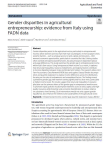Amato M., Coppola A., Furno M., Verneau F. (2025). Gender disparities in agricultural entrepreneurship: evidence from Italy using FADN data. Agricultural and Food Economics, 01/12/2025, vol. 13, n. 1, p. 46.
https://doi.org/10.1186/s40100-025-00390-6
https://doi.org/10.1186/s40100-025-00390-6
| Titre : | Gender disparities in agricultural entrepreneurship: evidence from Italy using FADN data (2025) |
| Auteurs : | M. Amato ; A. Coppola ; M. Furno ; F. Verneau |
| Type de document : | Article |
| Dans : | Agricultural and Food Economics (vol. 13, n. 1, December 2025) |
| Article en page(s) : | p. 46 |
| Langues : | Anglais |
| Langues du résumé : | Anglais |
| Catégories : |
Catégories principales 14 - SOCIOLOGIE ; 14.6 - Rôle de la FemmeThésaurus IAMM EXPLOITATION AGRICOLE ; ENTREPREUNARIAT ; GENRE FEMMES HOMMES ; ROLE DES FEMMES ; FEMME ; ITALIE |
| Résumé : | Gender disparities persist in the agricultural sector, particularly in entrepreneurial income, where women earn less than their male counterparts. In the European Union, systemic barriers-such as unequal access to land, capital, and resources-limit women's economic opportunities, particularly in countries like Italy. Existing studies often overlook entrepreneurial dimensions, focusing instead on dependent labour and wage differences. This study examines the gender gap in entrepreneurial income within Italy's farm sector. Using "entrepreneurs' work income" as a metric, it explores how structural inequalities, resource endowments, and regional factors contribute to income disparities between male and female farm holders. The research utilises 2021 Farm Accountancy Data Network (FADN) data and applies Oaxaca-Blinder decomposition and quantile regression to analyse income differences across the distribution, focusing on the roles of endowments and unexplained factors. The findings reveal a persistent gender gap, with women earning significantly less than men, particularly at higher income levels. The results suggest that structural inequalities in resource allocation are the primary drivers of the gender gap in entrepreneurs' work income. To promote equity, policies should improve women's access to land, capital, and high-quality resources while fostering rural economic diversification to reduce reliance on subsistence-level farming. Such interventions would not only support gender equality but also enhance the resilience and sustainability of the agricultural sector. |
| Cote : | En ligne |
| URL / DOI : | https://doi.org/10.1186/s40100-025-00390-6 |







